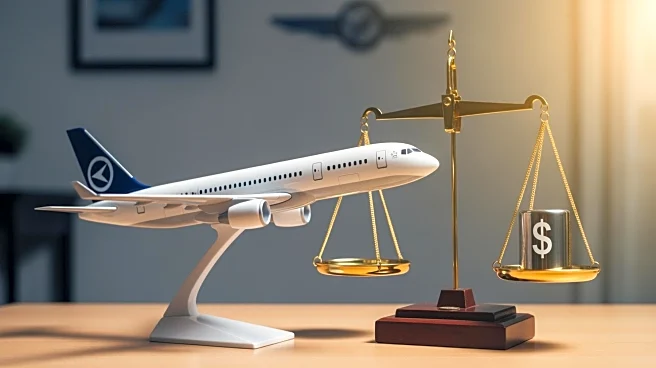What's Happening?
A U.S. federal judge in Texas has dismissed a criminal conspiracy charge against Boeing related to two fatal crashes involving its 737 Max jetliners, which resulted in the deaths of 346 people. The decision follows a deal in which Boeing agreed to pay
or invest an additional $1.1 billion in fines, compensation for victims' families, and improvements in safety and quality measures. The case, which began with charges in January 2021, accused Boeing of deceiving regulators about a flight-control system implicated in the crashes. Despite emotional appeals from victims' families to reject the deal, the judge ruled in favor of dismissal, citing the Justice Department's belief that the agreement serves the public interest better than a trial.
Why It's Important?
The dismissal of the criminal charge against Boeing is significant for the aerospace industry and regulatory practices. It highlights the complexities of holding corporations accountable for safety failures and the balance between legal consequences and financial settlements. The decision may impact how future cases involving corporate negligence are handled, potentially influencing regulatory oversight and corporate compliance strategies. For Boeing, the settlement allows the company to avoid a prolonged legal battle, enabling it to focus on restoring its reputation and ensuring the safety of its aircraft. However, the outcome has left some victims' families dissatisfied, raising questions about justice and corporate responsibility.
What's Next?
Boeing has committed to fulfilling its agreement with the Justice Department, which includes enhancing its safety, quality, and compliance programs. The company will likely continue efforts to rebuild trust with regulators, airlines, and the public. Meanwhile, the families of crash victims may pursue other legal avenues for compensation or accountability. The aviation industry and regulatory bodies may also review and potentially revise safety protocols and certification processes to prevent similar incidents in the future.
Beyond the Headlines
The case underscores the ethical and legal challenges in addressing corporate misconduct, particularly when it involves public safety. It raises broader questions about the adequacy of financial settlements as a deterrent for corporate negligence and the role of the justice system in ensuring accountability. The situation also highlights the emotional toll on victims' families and the ongoing struggle for closure and justice.















